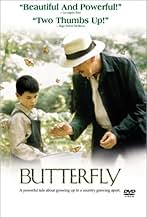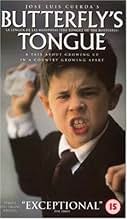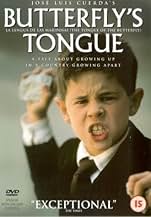IMDb RATING
7.6/10
10K
YOUR RATING
Spain, 1936. Moncho is an outcast at school but is able to form a strong bond with his outspoken teacher. When fascism arrives to Spain, his teacher is considered an enemy of the regime.Spain, 1936. Moncho is an outcast at school but is able to form a strong bond with his outspoken teacher. When fascism arrives to Spain, his teacher is considered an enemy of the regime.Spain, 1936. Moncho is an outcast at school but is able to form a strong bond with his outspoken teacher. When fascism arrives to Spain, his teacher is considered an enemy of the regime.
- Director
- Writers
- Stars
- Awards
- 6 wins & 19 nominations total
Elena Bagutta
- Carmiña
- (as Elena Fernández)
Roberto Vidal Bolaño
- Boal
- (as Roberto Vidal)
Antonio Lagares
- Alcalde
- (as Tucho Lagares)
- Director
- Writers
- All cast & crew
- Production, box office & more at IMDbPro
Featured reviews
This one was one of the excellent movies I have seen for the last couple of years. It takes you back to 1936, Spanish War in Galicia. Telling the truth I did not know well what happened there exactly . But this movie showed how the war influenced those people who lived in a small town to live their small lives. By the time they showed the ending scene my heart ached. I truly wished that someone could have been here with me to enjoy the afterglow this time. It has not happened to me lately. Plus their way to take this film was exquisite. Every single scene was beautiful and sentimental as if you turn around the post cards stand at the souvenir shop.
In this film, we see Spain lurching toward the brink of the Spanish Civil War through the huge uncomprehending eyes of the child Moncho. The metaphor for "Butterfly" has many complex applications in this film but for me the most profound of them was the moment that Moncho's saintly teacher captures a butterfly in a net, tenderly observes it and then sets it free. If only the future of Spain had been in such sensitive hands. As the film progresses through its beautifully photographed scenes of ordinary life, the reality of the evils of Fascism and the hope of the Republicans begin to chasm the serenity of the land.
The film is not about war, it is rather, about how much personal honor people will trade for an idea of security for themselves and their families. In a way, it parallels the dilemma in the scene in Eisenstein's STRIKE in which a woman with starving children is thrown a coin by one of the factory bosses. Wonderfully executed performances in a profoundly moving film. -Rowena Silver
The film is not about war, it is rather, about how much personal honor people will trade for an idea of security for themselves and their families. In a way, it parallels the dilemma in the scene in Eisenstein's STRIKE in which a woman with starving children is thrown a coin by one of the factory bosses. Wonderfully executed performances in a profoundly moving film. -Rowena Silver
It's a beautiful (and too rare) thing to witness a child actor who can avoid the saccharine cutesiness so common to mainstream American child actors. In this film full of children there are, happily, no cloying, exaggerated "cute kid" moments.
The real beauty of La lengua de las mariposas is what's unspoken -- the truths that remain between the lines. The film's political theme is never heavy-handed, and its vivid and fascinating depiction of a turbulent moment in Spanish history has inspired in me a desire to learn more. Without spoiling the ending (which I read as fairly subversive, at least to an American audience), I must say I wasn't entirely surprised at what happened. It brought a tear to my eye and it's still making me think, three days later.
Those who liked this film should also see La Vita e Bella (Life Is Beautiful) and La notte di San Lorenzo (Night Of Shooting Stars), which are similar and may appeal equally, if not more.
The real beauty of La lengua de las mariposas is what's unspoken -- the truths that remain between the lines. The film's political theme is never heavy-handed, and its vivid and fascinating depiction of a turbulent moment in Spanish history has inspired in me a desire to learn more. Without spoiling the ending (which I read as fairly subversive, at least to an American audience), I must say I wasn't entirely surprised at what happened. It brought a tear to my eye and it's still making me think, three days later.
Those who liked this film should also see La Vita e Bella (Life Is Beautiful) and La notte di San Lorenzo (Night Of Shooting Stars), which are similar and may appeal equally, if not more.
Among recent Spanish films - and I refer to the last twenty five years -there has been some tendency towards an intimistic approach which rather limits deeper comprehension and the ability to grasp essential concepts for non-Spanish audiences, whether the film is dubbed or subtitled into English or not, or even for Spanish speaking people in Latin America. This causes certain difficulties, similar to what happens when European or North American audiences try to comprehend Chinese or Japanese films requiring knowledge of their history, culture, mores and values. This has certainly been the case with `Las Ratas' (1998) directed by Giménez Rico, and to some degree with other Spanish masterpieces such as `El Sur' (1982), `Los Santos Innocentes' (1984), and to a lesser extent with `El Abuelo' (1999) - reviewed elsewhere in IMDb. Perhaps for general audiences `La Plaza del Diamante' (1981, Francisco Beltrú), `Últimas Tardes con Teresa' (1983, Gonzalo Herralde), and `Las Bicicletas son para el Verano' (1983, Jaime Chávarri) are rather more accessible, but even so many nuances might be lost. This may well happen to many audiences watching the film known as `Butterfly' in English. The story is set in the north western region of Galicia during the winter and spring preceeding the outbreak of the Civil War, and told through the eyes of a little boy - Moncho (Manuel Lozano) - a tailor's son and younger brother of a would-be saxophonist. The film is a point-counterpoint on the values of friendship, loyalty and other feelings so common to ordinary townspeople living their easy and uncomplicated village lives, values which just break down under fear. You have to understand certain principles of Spanish behaviour veering from foolhardy courageousness to outright cowardice, from close friendship to open hostility, superbly summed up in the close-up final shot of Moncho's face, half angry and embittered, half bewildered and confused, as the lorry drives away. Fernando Fernán-Gómez is masterful as the lonely schoolteacher and Manuel Lozano as Moncho is definitely something very special. Watch out for Fernán-Gómez directing Manuel Lozano in `Lázaro de Tormes' (based on an anonymous medieval tale) and José Luis Garci directing him in `You're The One" (both 2000). `La Lengua de las Mariposas' is also highly recommendable for its beautiful photography in the lushly wooded green hills and valleys around Allariz and the River Arnoia in Ourense, one of the four provinces of Galicia. Worth 8 out of 10.
I've been watching a lot of films in Spanish lately, trying to prepare for a course I will be teaching on Love in Hispanic Cinema. I'm searching for the film I can show that will exemplify love of country... and while I don't think this is the one I'm looking for, it may work insofar as the "love of Spain" expressed resonates with the same propagandistic tones similar expressions of "patriotism" so often do.
I won't bore you with the basics of plot nor repeat what everyone else has already said as you can read the intro and a hand-full of other posts and know enough. I will tell you that this is a subtle film. We in the US are so used to being hit over the head by our movies that watching this film is like feeling a soft breeze. It's oh so quietly disquieting.
I have found interesting the posts reviewing this film that criticize the "meanderings" of the plot --how far the dispersed elements take us away from the core message. But I ask, what is not childhood but a collection of fascinating and disconnected pieces of a puzzle that we can't put together quite yet. Music, love, family, sex, food, school, friends, women and girls, books, nature, teachers and grown men -all equally interesting and engaging to a young boy. But when he's all of maybe seven, what does he know about how they all relate to each other? What do any of us really know about how all the pieces of our lives fit together, or what they mean?
I especially enjoyed the sad quality of all the varied losses interwoven in the greater story; they tempered the otherwise hopeful mood of the film. The overall effect on me was that I understood that loss is comprised not only of one deep cut but of a thousand little ones too. It wasn't only the dream of a Republican and free Spain that was lost; it was much more that was lost as well.
The film-making here is exquisite too, like a butterfly, so beautiful visually; "La lengua de las mariposas" is so well executed that it truly feels real. There were no moments when I said to myself "oh, come on," as I do when I feel I've been taken for too stupid to figure things out for myself, when everything has been made too obvious, predigested for me by the movie makers.
Amazingly the child actor is believable at all times -never too precocious, never too coy. An excellent performance from a child actor is always a delight. See the Argentine film "Valentin" (2002) for another.
Others write that the ending is shocking, too abrupt and that the audience is neither prepared for it nor guided towards it. For me that is the perfect ending because it replicates the shock of the civil war to the Spaniards, and the shock adult violence inflicts upon childhood. For me, the abrupt ending was the radical interruption traditional Spain forced upon everyone's future. Never mind, as one post suggested that in Republican Spain the communists had taken over and democracy was no longer in effect. Democracy here is the exotic Chinese beauty Andrés falls in love with, a fantasy out of reach, silenced and taken hostage by a brute.
See this film and decide for yourself.
I won't bore you with the basics of plot nor repeat what everyone else has already said as you can read the intro and a hand-full of other posts and know enough. I will tell you that this is a subtle film. We in the US are so used to being hit over the head by our movies that watching this film is like feeling a soft breeze. It's oh so quietly disquieting.
I have found interesting the posts reviewing this film that criticize the "meanderings" of the plot --how far the dispersed elements take us away from the core message. But I ask, what is not childhood but a collection of fascinating and disconnected pieces of a puzzle that we can't put together quite yet. Music, love, family, sex, food, school, friends, women and girls, books, nature, teachers and grown men -all equally interesting and engaging to a young boy. But when he's all of maybe seven, what does he know about how they all relate to each other? What do any of us really know about how all the pieces of our lives fit together, or what they mean?
I especially enjoyed the sad quality of all the varied losses interwoven in the greater story; they tempered the otherwise hopeful mood of the film. The overall effect on me was that I understood that loss is comprised not only of one deep cut but of a thousand little ones too. It wasn't only the dream of a Republican and free Spain that was lost; it was much more that was lost as well.
The film-making here is exquisite too, like a butterfly, so beautiful visually; "La lengua de las mariposas" is so well executed that it truly feels real. There were no moments when I said to myself "oh, come on," as I do when I feel I've been taken for too stupid to figure things out for myself, when everything has been made too obvious, predigested for me by the movie makers.
Amazingly the child actor is believable at all times -never too precocious, never too coy. An excellent performance from a child actor is always a delight. See the Argentine film "Valentin" (2002) for another.
Others write that the ending is shocking, too abrupt and that the audience is neither prepared for it nor guided towards it. For me that is the perfect ending because it replicates the shock of the civil war to the Spaniards, and the shock adult violence inflicts upon childhood. For me, the abrupt ending was the radical interruption traditional Spain forced upon everyone's future. Never mind, as one post suggested that in Republican Spain the communists had taken over and democracy was no longer in effect. Democracy here is the exotic Chinese beauty Andrés falls in love with, a fantasy out of reach, silenced and taken hostage by a brute.
See this film and decide for yourself.
Did you know
- TriviaOn one of their walks home (at 0:38:41), Moncho asks Andrés whether he knows what a tilonorrinco is and proceeds to talk about an Australian bird. In Spanish tilonorrinco is what in English is called the satin bowerbird (Ptilonorhynchus violaceus), a bowerbird endemic to eastern Australia.
- SoundtracksEn er mundo
Written by Juan Quintero (as Juan Quintero Muñoz) and Jesús Fernández Lorenzo
- How long is Butterfly?Powered by Alexa
Details
Box office
- Gross US & Canada
- $2,092,682
- Gross worldwide
- $7,738,129
- Runtime
- 1h 36m(96 min)
- Color
- Sound mix
- Aspect ratio
- 2.35 : 1
Contribute to this page
Suggest an edit or add missing content
















